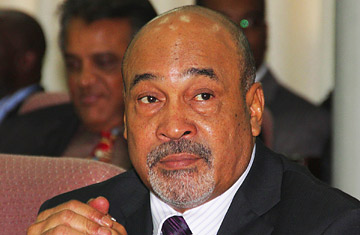
Former coup leader and military strongman Desi Bouterse, in the house of parliament in Paramaribo, on July 19, 2010, after he was elected president of Suriname by the South American country's parliament.
South America gave up its dictator habit two decades ago. It's fallen off the wagon at times, evidenced by the authoritarian binge of then-Peruvian President Alberto Fujimori in the 1990s. But compared to past generations, and despite critics' charges that Venezuelan President Hugo Chávez and his leftist allies are Fidel Castro wannabes, the region today is largely tyrant-free and democratically sober.
Which is why Thursday's scheduled inauguration of Suriname's President-elect, former dictator Desi Bouterse, is raising tropical concerns. In the 1980s, Bouterse, 64, was the archetype of the banana republic despot, the military strongman in beret and dark glasses. And yet, even though he's currently on trial in Suriname for the 1982 massacre of 15 political opponents, the country's parliament elected him President on July 19. That indicates not just how shallow the pool of political leadership is in Suriname; it's also left many inside and outside the country wondering if an addiction to the iron fist still lingers in Latin America.
In his victory speech, Bouterse asked his detractors to "leave the past behind so we can build this country together." He has popular support but many Surinamese were still angered by the parliament's choice. "We have gone totally mad in this country," government employee Michael Charles told reporters after Bouterse's win was announced. Nor was the news welcome among Suriname's neighbors. In Jamaica, the daily Gleaner called on the Carribbean Community (Caricom) not to seat Bouterse when he's President: "The passage of time doesn't of itself free [leaders] of responsibility for acts of impunity."
Bouterse insists he's a recovered totalitarian, a born-again democrat who has apologized for his dictatorship's excesses and says that as President he won't impede his ongoing trial, which began in 2007. He denies any direct involvement in the December 1982 killings — the victims were rounded up in the night, taken to a military base and executed — or in the army's 1986 massacre of villagers during a civil war with anti-Bouterse rebels. The presidency does not grant him immunity from prosecution; but if he's eventually found guilty, as President he can grant himself amnesty. That's a big reason, many speculate, that he ran for the five-year term. "He won't interfere with the trial, but he probably won't take its verdict too seriously either," says Hans Breeveld, a political analyst at Anton de Kom University in Suriname's capital, Paramaribo.
Suriname, a developing nation located at the edge of the Amazon rainforest on South America's northeast coast and home to some of the world's largest reserves of bauxite, a key aluminum ore, was a Dutch colony until 1975. It had been an independent republic for only five years when Bouterse helped lead a military coup in 1980 and then installed himself as a socialist dictator. In 1987 he allowed the election of a new government but kept control of the army. Three years later he staged his "telephone coup," dismissing the government with a phone call and taking power again. But with the South American dictator craze over — Chile's monstrous Augusto Pinochet stepped down the same year — Bouterse found his popular backing had thinned considerably. Civilian government returned a year later.
In 1999, Bouterse's image was darkened further when a Dutch court convicted him in abstentia for cocaine trafficking. (He denies the charge and has avoided prison time in the Netherlands since it and Suriname have no extradition treaty.) Still, most Surinamese seem willing to give Bouterse a chance to redeem himself. "I think he wants to better his name," says Breeveld. "And it's not like he was Idi Amin or something at that level." What's more, Breeveld adds, "he's still very charismatic," unlike the older, more staid political establishment represented by outgoing President Ronald Venetiaan, 74.
That has attracted Suriname's large youth population. The country's political parties tend to align not so much by philosophy as by ethnicity — the Suriname's half a million people are some of the world's most cosmopolitan, a mix of Dutch, African, Indian, Amerindian and myriad other ancestries — and increasingly, younger citizens no longer join them. Many are drawn to Bouterse's new multi-ethnic Mega Combination coalition, which won 23 of 51 parliamentary seats in May elections, as well as the self-reliant nationalism he preached as a leftist military leader, which helped give rise to Suriname's state oil company, Staatsolie. "Surinamese feel they're at the point of development," says Breeveld, "but the young don't think the traditional parties have paid enough attention to the question of wealth distribution."
At least this time Bouterse was elected. Still, history will judge the new Bouterse, as well as the rest of South America's new leadership, by how democratically they govern more than by how democratically they're chosen. Which means to a lot of people that Bouterse should step down from the presidency if he's ultimately convicted of the 1982 massacre. But old habits die hard. Which means, don't count on him doing that.
